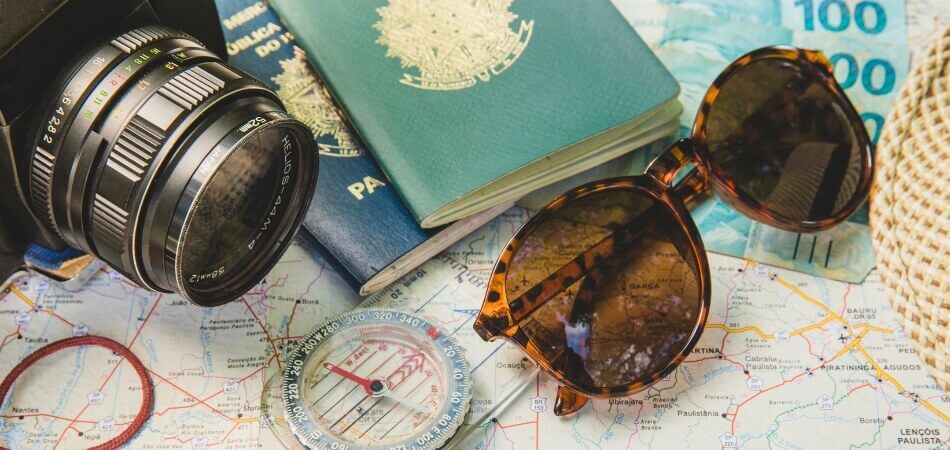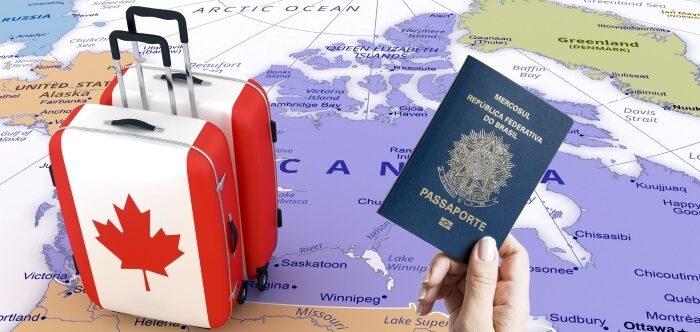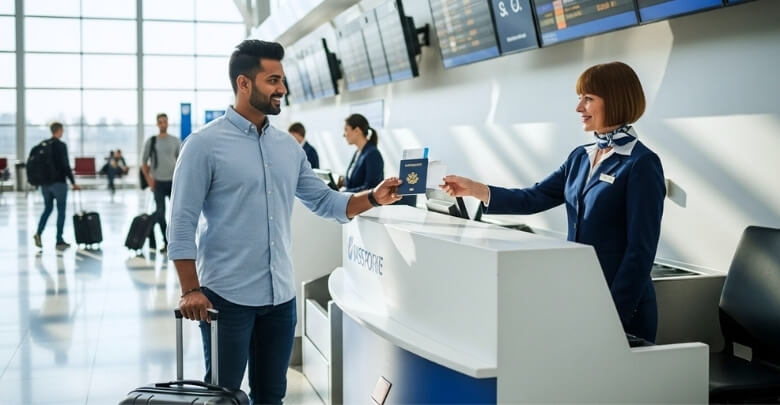The process of getting a Canada Conference Visa involves more than just filling out a form. You’ll need to show a clear reason for travel, enough money for your trip, and sometimes, details about your past travels. In those situations, most people start thinking about one thing: Is travel history important for a Canada conference visa?
Yes, travel history is important for a Canada conference visa. A positive travel record shows that you followed immigration rules in other countries, returned home on time, and respected visa conditions. It builds trust with Canadian authorities, proves you are a low-risk traveler, and can improve your chances of getting approval when combined with other required documents.
Are you curious about how travel history makes a difference or what role it plays in the overall application? If so, keep reading because this article explains everything you need to know in simple terms and covers all the key details about this topic.
Is Travel History Important for a Canada Conference Visa?
When applying for a Canada conference visa, travel history matters. Your past travel record plays a role in how visa officers look at your application. It can make your file appear stronger, but it’s not the only factor that matters. To understand why travel history holds weight in a Canada conference visa, check the points below.

Builds Trust
A good travel history shows that you have respected the rules of the other countries you have visited before. Visa officers see this as a sign that you will also follow Canada’s rules. It creates confidence that you will not overstay your visa. This simple factor can increase the chances of approval.
Shows Travel Experience
When you have visited other countries, it proves that you can handle international trips. It shows you know how to manage visas, airports, and travel plans. Canadian authorities see this experience as a positive sign. This is especially helpful when applying to attend conferences in Canada, as it shows you are ready for international events. It helps them believe you are prepared for your visit.
Clarifies Intentions
Past trips often tell a story about why you travel. If you always return home on time, it suggests you will do the same after visiting Canada. It shows that your main aim is to attend the event and return. This helps lower doubts about your intentions.
Proves Compliance
Your travel record can show how well you followed visa conditions before. Things like exit stamps and no overstays are signs of compliance. Visa officers check this to ensure you respect the rules. A clean record makes your case stronger.
Indicates Stability
Frequent and well-managed trips often point to financial stability. It shows you can afford to travel and take care of your expenses. Visa officers look for this when judging if you can support yourself in Canada. It adds weight to your application.
Supports Application Strength
Travel history alone may not secure a visa, but it adds value when paired with other documents. Proof of funds, an invitation letter, and a travel plan are all important. Together with a solid history, they make your case more reliable. Having balance across all parts of the application improves your approval chances.
Reduces Risk Concerns
A consistent travel record reassures officers that you are unlikely to overstay. It reduces the fear that you might break immigration rules. When officials see low risk, they are more comfortable approving your visa. This makes travel history a helpful part of the process.
What Counts as Travel History and How to Show It?
Visa officers carefully review your travel history to understand your travel behavior. It helps them see where you’ve been, how you managed past trips, and whether you followed the rules. But not every trip holds the same weight. If you’re not sure what really counts as travel history, keep reading below to find out.
Passport Stamps
Passport stamps are one of the easiest ways to show travel history. They prove where and when you entered or left a country. Officers look at these stamps to check if you followed the rules during past trips. Even short visits can be helpful if they’re clearly stamped. Keep your old passports safe, as they hold useful proof.
Visa Stickers
If you’ve ever applied for a visa before, the visa stickers in your passport also count as travel history. They show which countries trusted you with a visa. Officers also check if you used those visas properly without overstaying. Even a single visa from a known country can help. Make sure you include clear copies of these pages.
Old Passports
Sometimes your travel record is in a passport that’s expired. That doesn’t mean it’s useless. Keep your old passports and include them if they show past travel. Officers often ask to see them to understand your full travel background. These old documents can still make your application stronger.
Short Foreign Trips
Not all trips have to be long to matter. Even short visits to nearby countries show that you traveled and returned on time. These small trips help prove you follow rules and don’t overstay. If you’ve taken any, include them in your travel list. It adds to your overall record.
Entry and Exit Records
If your country offers digital records or stamps for leaving and entering, you can use those too. These show that you came back on time after traveling. Some countries allow you to request a travel record for this purpose. It’s an extra way to support your case. Use this if you don’t have physical stamps or visas.
Other Factors to Consider for A Canadian Conference Visa Beyond Travel History
Getting a Canadian conference visa requires more than showing where you have traveled before. Officials look at many details to confirm you are a genuine visitor. These extra factors can make your application stronger. To see what matters most, check below.
Invitation Letter
A conference invitation letter is one of the most important documents. It proves that you have a clear reason for traveling to Canada. The letter usually includes event details and your role. This gives officers confidence that your visit has a genuine purpose.
Proof of Funds
You must show that you can pay for your trip without problems. Bank statements or a sponsor’s support letter can be used. Meeting the bank balance requirement for Canada visa shows you are financially prepared. It also proves you can cover return travel costs.
Ties to Home Country
Strong ties to your home country assure officers that you will return after the event. These can include family connections, property ownership, or business responsibilities. Such ties reduce the chance of overstaying in Canada. They play a major role in visa decisions.
Employment Proof
Proof of employment helps show that you are stable and committed in your home country. A letter from your employer stating your position and leave dates is useful. It highlights that you are expected back at work. This adds credibility to your application.
Business Records
If you run a business, showing proper documents strengthens your file. Business registration, tax papers, or client contracts prove you have responsibilities at home. These records reflect stability and strong ties. Officers view them as clear reasons for you to return.
Accommodation Details
Visa officers often want to know where you will stay. Hotel bookings or a host’s address are both acceptable. Clear accommodation plans show you are well prepared. This also reduces doubts about your arrangements during the visit.
Return Plans
Proving that you plan to leave Canada on time is vital. A return ticket booking or travel plan helps show this. Even a written itinerary with dates can help. Officers feel more secure when they see you intend to go back.
Complete Documentation
Submitting a well-organized file makes a strong impression. Missing or unclear papers can cause delays or refusals. Double-check that every required document is included. A complete file shows you are serious and careful about your application.
Does Attending Conferences Help Future Visa Applications?
Yes, attending conferences can help future visa applications. Conference visits show that you traveled for a clear and valid reason. They prove that you respected visa rules, returned on time, and followed proper travel guidelines during your stay abroad.
Consistent attendance at international events highlights your reliability and responsible travel behavior. Visa officers value applicants who show a record of lawful trips. A history of conferences also demonstrates that you had genuine purposes for travel, which strengthens future applications.
If you are planning to apply for another visa later, this kind of record can make a big difference. Authorities often compare past visits to measure your trustworthiness. Having proof of conference attendance may reduce doubts and improve approval chances.
How First-time Applicants Can Compensate for Limited Travel History?
Having no travel history for Canada visa does not mean your visa will be refused. Visa officers look at other strong factors before making a decision. By focusing on the right documents and proof, you can still build a strong case. To see how first-time applicants can make up for limited travel history, read the points below.
Detailed Cover Letter
A well-written cover letter can explain your purpose of visit clearly. It should mention why you are attending the conference. Adding details about your background and plans makes your intent stronger. This letter helps officers understand your case better.
Conference Documents
Attach all required documents for Canada conference visa, including the official invitation letter, registration slip, and event schedule. Clear documentation proves your visit has a genuine purpose. It also shows you are well-prepared for the event.
Academic Records
If you are still studying or have recently graduated, your academic records can add strength to your application. Certificates, transcripts, or enrollment letters prove you have commitments at home. These documents help officers see that you are tied to your studies. Even a simple proof from your school or college can be useful.
Professional Certificates
Professional certificates or membership cards from industry groups can support your case. They show that you are active in your field and serious about your work. These documents highlight your purpose for attending the conference. Officers see them as extra proof of your genuine reasons for travel.
Employer Reference Letter
Instead of just employment proof, add a detailed reference letter from your employer. You can mention your role and responsibilities. It should also confirm your leave and return date. This shows officers that you are trusted and needed back.
Property or Lease Documents
Owning property or having a lease agreement shows strong ties to your home country. These documents prove you have obligations at home. Even rental agreements can be useful. They add another layer of trust to your file.
Community Involvement
Letters or certificates showing that you take part in community or volunteer work can also help. They prove that you are engaged in activities at home. This builds trust that you have reasons to return after your trip. Adding such documents gives more strength to your application.
Tips to Build a Positive Travel History Over Time
Building a strong travel history does not happen overnight. It takes small steps and smart choices to make your record better. With the right planning, you can show visa officers that you are a reliable traveler. Check out the advice below to see how you can create a favorable travel record:
Start with Nearby Countries
Traveling to nearby countries is a simple way to begin. These trips often have easier visa rules and faster approvals. Short visits still count as proof of responsible travel. They show that you can handle border rules and return on time.
Attend Regional Events
Joining regional events, workshops, or conferences helps you build a purpose for travel. These activities add value to your record. Event stamps and documents prove that you traveled for genuine reasons. Officers see this as a sign of responsible trips.
Choose Visa-Friendly Nations
Applying to countries with easier visa policies can be a good first step. These countries are more likely to approve new travelers. Once you visit them, you start building a credible record. This makes future applications stronger.
Keep All Passports
Never throw away old passports even after they expire. They carry stamps and visas that prove their travel history. Officers may ask to see them during applications. Keeping them safe gives you solid proof when needed.
Respect Visa Rules
Following the rules of each visa is very important. Always return before your visa expires and avoid overstays. Respecting conditions builds trust with immigration officers. Each rule you follow strengthens your travel record.
Document Every Trip
Save tickets, hotel bookings, and event registrations from your travels. These extra papers support your official stamps and visas. They show that you had real travel plans. Keeping this record makes your application file stronger.
Plan Gradual Growth
Do not rush to visit far-off places immediately. Build your travel history step by step with shorter, simpler trips first. Over time, your record will look steady and reliable. This steady growth improves your chances for tougher visas later.
Frequently Asked Questions
If you are applying for a Canada Conference Visa, you might have many questions about how travel history plays a role and what else matters. Below, you will find clear answers to common questions that can guide you through the process.
Does a Lack of Travel History Mean My Visa Will Be Rejected?
No, not having past travel history does not mean your visa will be refused. Canadian visa officers look at the full application, including your financial proof, ties to your home country, and invitation letter. If these are strong, you can still be approved.
Does Group Travel Have the Same Value as Solo Travel?
Yes, group travel is still counted as part of your travel history. Whether you traveled alone or with others, what matters is that you followed immigration rules and returned on time. The purpose and compliance are more important than the style of travel.
How Do Visa Officers Verify My Travel History?
Visa officers check your passports, stamps, visas, and sometimes entry and exit records from your country. They also cross-check this with immigration databases. Providing clear and honest documents helps them quickly confirm your travel background without raising doubts.
Can Business Travel Count as Travel History for a Visa?
Yes, business trips are part of your travel history. They show that you traveled for genuine purposes, handled international requirements, and returned home on time. Business travel also demonstrates responsibility and can help prove that your Canada conference visit is credible.
Do Domestic Trips Count Toward Travel History?
No, domestic travel within your own country does not count as international travel history. Visa officers are mainly interested in whether you have followed immigration rules abroad. International trips, even short ones, are what strengthen your travel record.
How Does Canadian Travel History Help in Future Visa Applications?
Canadian travel history helps in future visa applications by showing a consistent record of responsible travel. A strong Canada travel record proves that you follow rules, return home on time, and manage trips responsibly. This builds trust with visa officers and improves your chances of future approvals.
Can Travel for Religious Pilgrimages Count as Travel History?
Yes, religious trips like Hajj, Umrah, or other pilgrimages are valid parts of your travel record. They show that you traveled for a clear reason and returned on time. Visa officers accept such trips as proof of responsible travel behavior.
Is Travel History Important for Canada Visa?
Yes, travel history is important for a Canada visa. It shows that you followed immigration rules in other countries and returned home on time. This helps visa officers trust that you will do the same in Canada.
Bottom Line
Travel history might not be the only factor, but it does play a big role in how your application is viewed. It’s like a record that shows your honesty, responsibility, and respect for rules during past trips. A clean history makes officers more confident about your plans.
If you are wondering, is travel history important for a Canada conference visa? The answer is yes. It strengthens your file and reduces doubts, especially when paired with the right documents like proof of funds and an invitation letter.
Even if you are applying for the first time, don’t worry. With strong ties to your home country and complete documents, you can still make your case solid. Over time, building a travel history will only make future applications easier.







